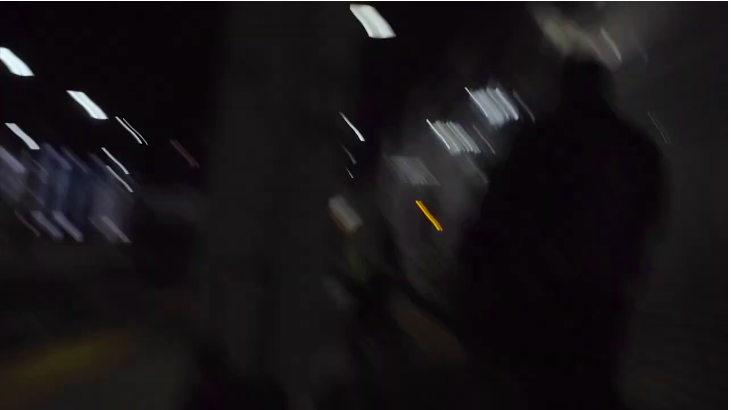Emerald Flaviano Manlapaz
In No Data Plan (2019), Miko Revereza enfolds us in an experience. This experience, a three-day train ride from Los Angeles to New York, is marked by Revereza’s subjectivity, revealed piece by piece in spare camerawork and the peculiar use of subtitles and voice-overs. The trip takes on, in the process, a life of its own as a document of disappointed dreams, a family’s slow breakdown, and a young artist’s defiance against the crushing weight of inertia imposed by an indifferent state. As a body in itself, No Data Plan tackles movement as the necessary condition of the undocumented immigrant, even as it moves and marks its difference from the human—the filmmaker’s own and its audience’s—body.
Opening with a waiting crowd on a platform—overwhelmed in the film frame by a huge pillar—No Data Plan sees the unremarkable from the trip. As inexorable as the straight line that the train traverses, the camera trains its eye on the inside of the train, the blurring freight cars and landscapes that pass beyond its dirty windows, the anonymous stops and their strangers. Someone raps along a barely audible song, doors between cars whisper open and shut, sunlight crawls on the back of a seat here, a table leg there. Time crawls as the unremarkable lulls, while subtitles and voice-overs relieve the enforced stasis inside the train. A “voice”—covert but present all the same—issues a confession and we are made aware of Revereza’s family’s immigration problem and his mother’s affair. “I was the only person she confided to…” a quiet declaration heavy as a lodestone. This burden pierces through his reverie, populated by dreams and memories recounted by family and friends, and overwhelms with its intimacy: after years in an unhappy marriage with Papa, Mama takes on a much younger lover, a Vietnamese “driver.” The family disintegrates, and Mama, an undocumented immigrant, begins a difficult life of constant displacement. Revereza himself tries to get the driver, whose shady connections include a meth addict who once threatened immigration authorities on Mama and her family, in trouble by taking a picture of him with his car. The confession is as uncomfortable in its unwelcome candor as the claustrophobic train ride. Its discordant presence insists that we listen as the textual narrative attends to the banal details of a family disintegrating—a GIANT STUFFED TOTORO which Papa does not notice, plasma TV, bird feeder, and “MISC” containers in storage.

Since his short film DROGA! (2014), Revereza has been working on notions of identity and statelessness. His films assemble traces of his life with his family (Lola’s stories and Lolo’s silence, old home movies of their first few years as a family in the US) and images from everyday life that conjure fantasies–and memories–of mobility (airplanes and airports, full motorways, his US visa as a 5-year-old child in 1993 and later, his unmarked Philippine passport as a young adult). These fantasies come up short in No Data Plan: movement is constant, but it is meaningless, this movement for the sake of movement. In a sense, the unbrokenness of the scenes from Revereza’s train trip samples this tedious movement that does not really get him anywhere. Instead, disembodied voices that speak over images of the trip, the camera’s random movements “outside” the train and the narrative, and distorted sounds that punctuate the documentary counter this stasis. These disruptions—dreams and memories, noise—speak of a mind that refuses to be bounded.
No Data Plan is notable among Revereza’s work in its bodily presence, making immediate the experience of being undocumented in America–the mundanity of its insecurity, the alternating torpid frustration and jagged fear. This body materializes from the self that speaks in confession, at its most precarious. A close up shot of a hand, clenched into a fist and pressed against a leg, while in the background Revereza can be heard shakily breathing, presages the recollection of an encounter with immigration authorities. He thinks this “the most significant shot” he takes in the trip. The camera is welded into his body, and the film becomes his body. The film, as does his body, closes in upon itself as the encounter unfolds. The camera shivers as the clenched hand engulfs the frame. For the moment, the meandering subtitles and voice-overs vanish, and the tension is everything. Unconsciously, we cower with Revereza. “Um did you see my story?” he unsteadily asks, apparently on the phone with someone, and narrates his close shave with the US Border Patrol at a stop in Buffalo, New York. His hand taps through the Instagram stories of the ordeal, the nakedly agitated texts a stark deviation from the deliberate introspection of the subtitles—“I’m ok 😰” “Wtf is America” “Help: do I decline questions on citizenship???” This jarring shift in mood in what is supposed to be a boring train ride, an ellipsis in narrative action in most films, reveals Revereza’s fragility in its naked everyday reality. It is certainly very different from the poetic voice that speaks in DROGA!, Disintegration 93-96 (2017), and Distancing (2019) that examines obsessively the extent to which he has lost his Filipino-ness, as a way perhaps to make sense of the choices his parents–but most especially his father–took to subscribe to the American “dream-hallucination-delusion.”

A study in impulse and reflexivity, Revereza’s diaristic practice explores the possibilities of a personal cinema that narrates the self into being. This self is, by virtue of its mediated construction, conjures context and inevitably labors under the politics of diaspora and identity, of borders and mobility. In choosing to be seen, Revereza assumes a voice that speaks for thousands of others driven to silence, that would somehow gather the dreamlike fragments of constantly longing life to work from them something whole and luminous and powerful.
Due to unforeseen circumstances, the 30th Annual Circle Citations for Distinguished Achievement in Film for 2019 is now scheduled on the first quarter of 2021 as a virtual event. The list of nominated and winning films can be found here. Reviews for these films, as well as other long-listed films, will be posted this week.